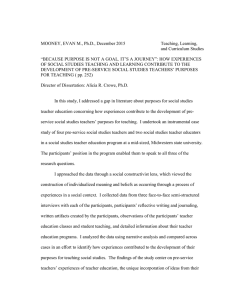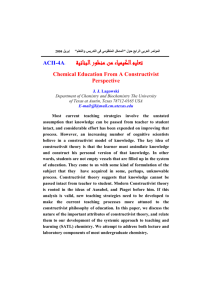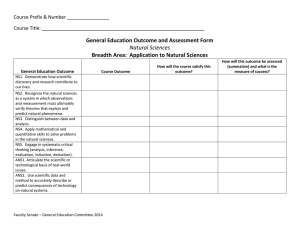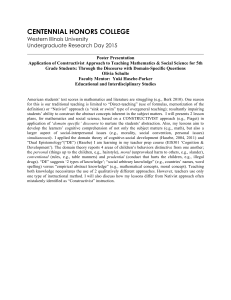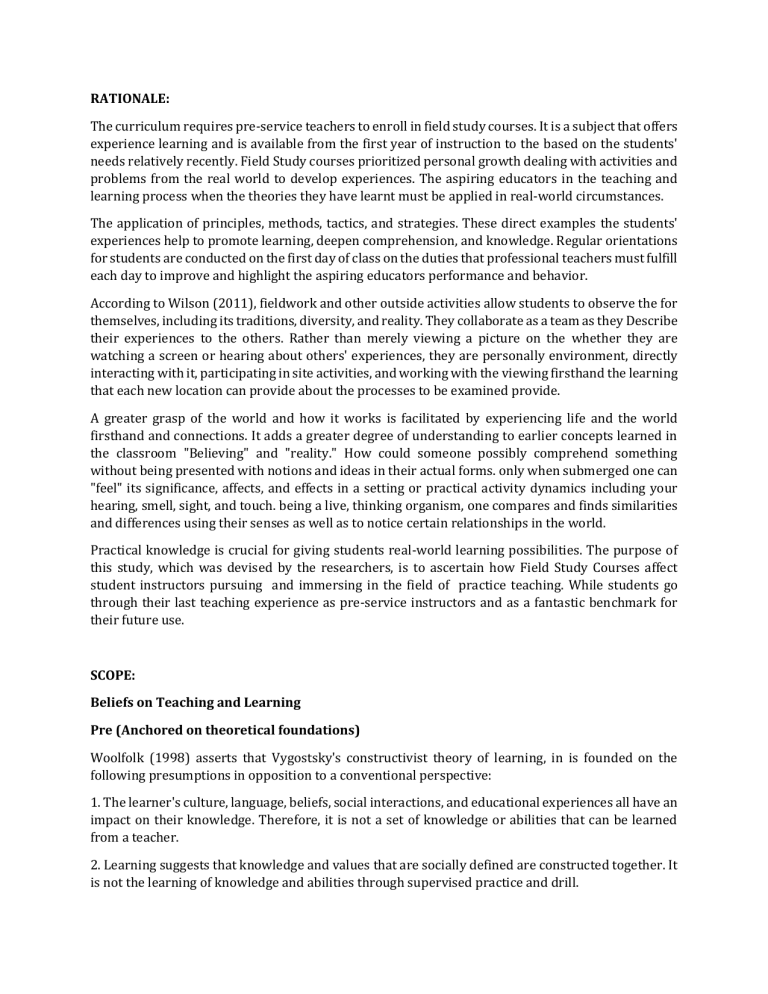
RATIONALE: The curriculum requires pre-service teachers to enroll in field study courses. It is a subject that offers experience learning and is available from the first year of instruction to the based on the students' needs relatively recently. Field Study courses prioritized personal growth dealing with activities and problems from the real world to develop experiences. The aspiring educators in the teaching and learning process when the theories they have learnt must be applied in real-world circumstances. The application of principles, methods, tactics, and strategies. These direct examples the students' experiences help to promote learning, deepen comprehension, and knowledge. Regular orientations for students are conducted on the first day of class on the duties that professional teachers must fulfill each day to improve and highlight the aspiring educators performance and behavior. According to Wilson (2011), fieldwork and other outside activities allow students to observe the for themselves, including its traditions, diversity, and reality. They collaborate as a team as they Describe their experiences to the others. Rather than merely viewing a picture on the whether they are watching a screen or hearing about others' experiences, they are personally environment, directly interacting with it, participating in site activities, and working with the viewing firsthand the learning that each new location can provide about the processes to be examined provide. A greater grasp of the world and how it works is facilitated by experiencing life and the world firsthand and connections. It adds a greater degree of understanding to earlier concepts learned in the classroom "Believing" and "reality." How could someone possibly comprehend something without being presented with notions and ideas in their actual forms. only when submerged one can "feel" its significance, affects, and effects in a setting or practical activity dynamics including your hearing, smell, sight, and touch. being a live, thinking organism, one compares and finds similarities and differences using their senses as well as to notice certain relationships in the world. Practical knowledge is crucial for giving students real-world learning possibilities. The purpose of this study, which was devised by the researchers, is to ascertain how Field Study Courses affect student instructors pursuing and immersing in the field of practice teaching. While students go through their last teaching experience as pre-service instructors and as a fantastic benchmark for their future use. SCOPE: Beliefs on Teaching and Learning Pre (Anchored on theoretical foundations) Woolfolk (1998) asserts that Vygostsky's constructivist theory of learning, in is founded on the following presumptions in opposition to a conventional perspective: 1. The learner's culture, language, beliefs, social interactions, and educational experiences all have an impact on their knowledge. Therefore, it is not a set of knowledge or abilities that can be learned from a teacher. 2. Learning suggests that knowledge and values that are socially defined are constructed together. It is not the learning of knowledge and abilities through supervised practice and drill. 3. Teaching entails creating knowledge together with the students, not imparting knowledge to them or telling them. 4. The function of the teacher is to direct and support learning, to hear the students' interpretations, and to collaborate with them in developing a different perspective on information. 5. The students' function is that of a socially engaged, active participant. A knowledge that actively considers, explains, understands, and examines. Their job is not to listen and follow instructions while passively taking in information. Constructivist teaching methods encourage students to actively engage in the meaning-making and conceptual-change processes as well as to explore, look for, and try new things as they learn. Children are encouraged to think critically, communicate effectively, utilize evidence to support their claims, revise their prior assumptions, produce new knowledge, and solve important problems. According to Falk, the constructivist approach to teaching takes into (1996), that learning takes place in a variety of rich contexts that give students real-world tasks, that social interaction is an essential component of learning and should be encouraged by teachers, that the diversity and differences of students should be valued by teachers, and that time should be set aside for students' in-depth understanding. Curricula should be centered on grand concepts or themes, teachers should take their students' interests and strengths into consideration when making plans, and evaluations should be objective, fair and ought to be varied. Post 1. It is crucial for students to be able to not only acquire the pertinent material designated by the state but also the skills necessary to apply that material. Students must become aware of their own comprehension and have the ability to analyze the material they have been given. 2. Combining with group, individual, and classroom work in the classroom. The learning environment for those who can't only learn anything one way would be improved because students have diverse learning styles. 3. Sexuality, religion, color, and other forms of diversity are all things that needs to be anticipated in the classroom. Recognizing that variety is prevalent everywhere impose restrictions on the students and encourage them to tolerate it. 4. Being that the brain grows more or less at different ages and that children develop in very different ways. Teachers must adapt their lessons to the developmental stage and age of each learner. The brains of young children are rapidly developing as they learn language and new words. Therefore, at this age, it is necessary to teach them how to read and write. References: 1. Dela Rosa, Elmer D. Co-Author/s: Abon, Marilou G. 2004. Program Analysis of Student Teaching of the Central Luzon State http://www.mesharpe.com Publication Date: 2009- 00-00 Pages: 13 Pub Types. 2. Magno, C. and Sembrano, J. 2007. The Role of Teacher Efficacy and Characteristics on Teaching Effectiveness, Performance, and Use of Learner-Centered Practices. The Asia Pacific Education Researcher, 16(1): 73-90. 3. Olstad, R.G. 1983. Preservice Teaching Performance: A Search for Predictor Variables. Final Report. Research Report No. 83-3. 4. https://scholarworks.uni.edu/cgi/viewcontent.cgi?article=1778&context=grp 5. https://ijciaropenaccess.com/docs/volume2/issue2/IJCIAR-01.pdf
